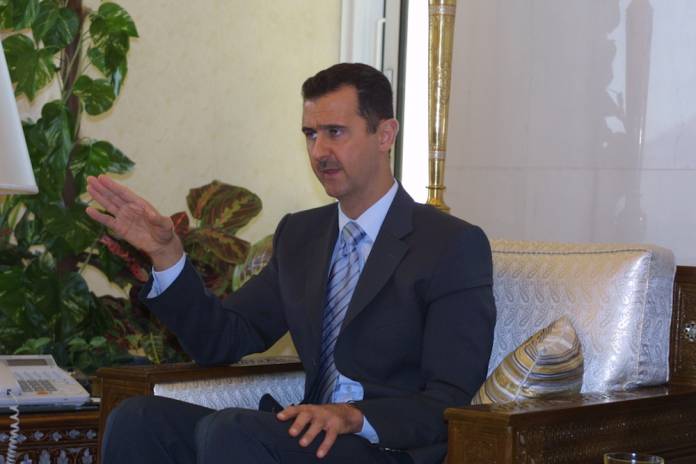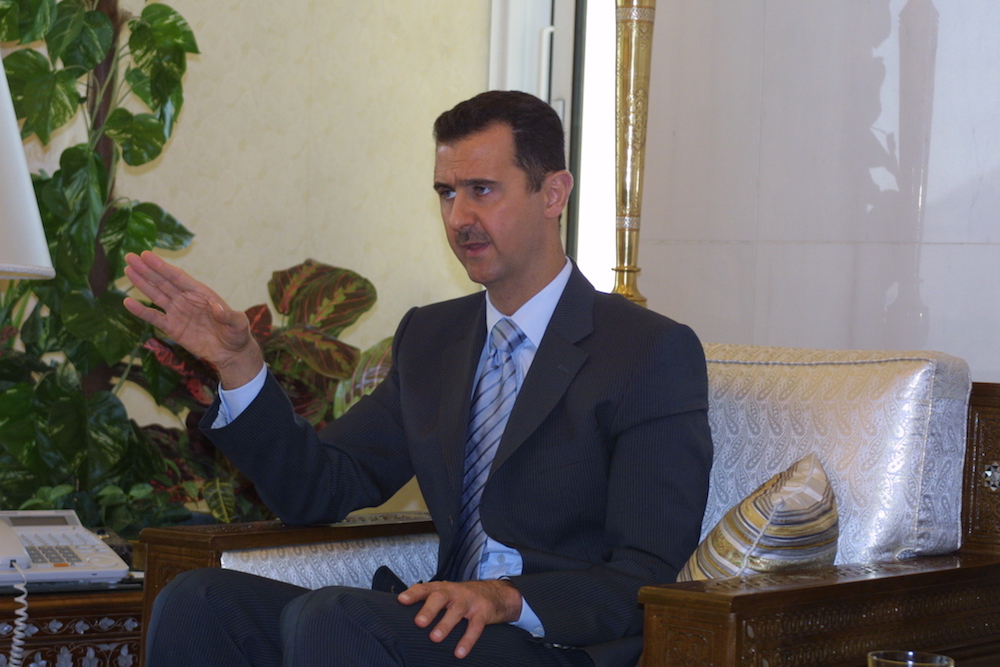
In 1998, al Qaeda killed 224 people when it attacked US embassies in East Africa. In retaliation, President Bill Clinton ordered a missile strike against what he described as an al Qaeda nerve gas factory in Sudan. For years he insisted that the attack had dealt a tough blow against terrorists. Turns out the chemical weapons factory was a pharmaceutical plant.
Now it looks like history is repeating itself.

On April 13, the United States, Britain, and France bombed three sites in Syria, which were supposedly key to Syria’s chemical weapons program. Russian sources claimed Syrian airfields were attacked as well.
Western missiles flattened the Barzeh Research Center in Damascus. Washington claimed it was a lab making chemical weapons.
Turns out it was a research facility making such products as antidotes for snake bites and children’s medicine. After the missile strike, the Assad government took foreign reporters to the site. The building was still smoldering but no chemical weapons fumes came from the structure.
Said Said, an official at the center told AFP, “If there were chemical weapons, we would not be able to stand here. I’ve been here since 5:30 am in full health — I’m not coughing.”
Such contrary evidence didn’t prevent the Pentagon from boasting of success. Lt. Gen. Kenneth McKenzie Jr., director of the joint staff at the Pentagon, said the attacks are “going to set Syrian chemical weapons program back for years.”
President Donald Trump led the cheerleading, tweeting “Mission Accomplished,” a declaration that immediately reminded everyone of George W. Bush’s failed war in Iraq.
Even by the reactionary standards of Washington, the attack is unlikely to have an impact on Assad’s war plans.
“I can’t believe that the Pentagon seriously thought that this wimpy missile attack would actually serve as a deterrent in the future,” William Beeman, professor of anthropology at the University of Minnesota and an author who has written extensively on the Middle East, told me. “This was a cosmetic strike. The Russians were warned, and it didn’t come close to attacking the full range of suspected chemical facilities.”
So what actually happened? On April 7, the White Helmets and other groups posted videos from the Damascus suburb of Douma showing people dying from what they described as a Syria air force chemical attack. They said the attack was likely chlorine gas and possibly the far more deadline nerve agent, sarin.
Douma is controlled by a right-wing political Islamist group known as the Army of Islam (Jaish el-Islam), which has been accused of using chemical weapons against the Kurds. It has a vested interest in discrediting the Assad regime.
Bob Fisk, a journalist with the British Independent, raised serious questions in his first-hand reporting from Douma. He interviewed a doctor who said people died from a lack of oxygen in underground tunnels, not chemical weapons.
Inspectors from the Organization for the Prohibition of Chemical Weapons are hoping to gain entrance to Douma and if allowed in should be able to determine if banned weapons were used. The organization does not seek to determine who, if anyone, unleashed the chemicals.
It may be as difficult to determine what happened in Douma as it has been in previous alleged chemical attacks. Both sides have used chemical weapons in the past. Rebel groups such as the al Qaeda affiliate used sarin to attack Syrian troops in 2013, as I described in my book Inside Syria.
UN chemical weapons inspectors have verified cases of the Syrian air force dropping chlorine gas. Assad’s military has been willing to face international condemnation because chemical weapons are a relatively cheap method of killing, wounding, and demoralizing an enemy.
Regardless of what happened in Douma, the United States has no legal or moral right to bomb Syria. The UN Security Council never authorized this or other recent US wars (Iraq, Yemen, Libya, Somalia, or previous attacks on Syria). The Trump administration is also violating the US War Powers Act, which prohibits the president from waging war without Congressional approval.
The most recent missile attacks had less to do with chemical weapons than sending a message to Assad: The White House won’t allow you to control all of your country. Assad, with crucial help from Russia and Iran, has been defeating insurgent groups throughout most of the country. Top Washington leaders care little about human rights in Syria but very much want to control the country for geopolitical reasons.
Syria doesn’t have significant amounts of oil, but it does occupy a strategic location bordering Israel, Lebanon, Turkey, Iraq and Jordan. British and French empires competed for control of the region before World War II, and modern-day imperialists do the same.
The United States now has more than 2,000 troops in northern Syria and is allied with a Kurdish group. The Wall Street Journaleditorial page, which often represents the views of the ultra-conservative business elite, now advocates creating a no fly zone in northern Syria, which would effectively carve out that region from Syrian government control.
Russia has its own imperialist interests in Syria. It has built two large military bases in western Syria with leases that could last 100 years. The base agreements give Russian citizens extra territoriality rights; they can’t be tried in Syrian courts for crimes committed in Syria. With Syria as a permanent ally, Russia seeks to block US influence in the region.
Vladimir Putin has “the same goal as Peter the Great,” said Beeman, “a permanent warm water port, an outpost in the Middle East, [and] … a watch post for U.S. activities in the area.”
The missile attacks on Syria lessen the already remote chances of a political settlement in Syria’s civil war. At the moment four countries have troops in Syria: United States, Turkey, Iran, and Russia. All foreign powers will have to pull out if the people of Syria are to determine their own future.
Reese Erlich’s syndicated column, Foreign Correspondent, appears every two weeks. The revised and updated edition of his book The Iran Agenda: the Real Story of U.S. Policy and the Middle East Crisis will be published in September. Follow him on Twitter, @ReeseErlich; friend him on Facebook, Reese Erlich Foreign Correspondent; and visit his webpage.



Erlich and Tucker Carlson agree. The far-left and the far-right often touch hands round the backside.